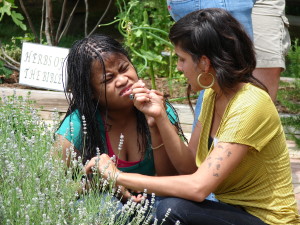Healing/Therapy/Ability Programs
go.ncsu.edu/readext?235139
en Español / em Português
El inglés es el idioma de control de esta página. En la medida en que haya algún conflicto entre la traducción al inglés y la traducción, el inglés prevalece.
Al hacer clic en el enlace de traducción se activa un servicio de traducción gratuito para convertir la página al español. Al igual que con cualquier traducción por Internet, la conversión no es sensible al contexto y puede que no traduzca el texto en su significado original. NC State Extension no garantiza la exactitud del texto traducido. Por favor, tenga en cuenta que algunas aplicaciones y/o servicios pueden no funcionar como se espera cuando se traducen.
Português
Inglês é o idioma de controle desta página. Na medida que haja algum conflito entre o texto original em Inglês e a tradução, o Inglês prevalece.
Ao clicar no link de tradução, um serviço gratuito de tradução será ativado para converter a página para o Português. Como em qualquer tradução pela internet, a conversão não é sensivel ao contexto e pode não ocorrer a tradução para o significado orginal. O serviço de Extensão da Carolina do Norte (NC State Extension) não garante a exatidão do texto traduzido. Por favor, observe que algumas funções ou serviços podem não funcionar como esperado após a tradução.
English
English is the controlling language of this page. To the extent there is any conflict between the English text and the translation, English controls.
Clicking on the translation link activates a free translation service to convert the page to Spanish. As with any Internet translation, the conversion is not context-sensitive and may not translate the text to its original meaning. NC State Extension does not guarantee the accuracy of the translated text. Please note that some applications and/or services may not function as expected when translated.
Collapse ▲
Image by John Murphy
Horticultural Therapy*
Horticultural therapy is the engagement of a client in horticultural activities facilitated by a trained therapist to achieve specific and documented treatment goals. Horticultural therapy programs can be found in a wide variety of healthcare, rehabilitative, and residential settings.
Types of Programs
Therapeutic Horticulture
Therapeutic Horticulture uses plants and plant-related activities to improve human well-being. This type of program may be found in a wide variety of healthcare, rehabilitative, and residential settings.
Social Horticulture
Social or Community Horticulture is a recreational activity related to plants and gardening. No treatment goals are defined, no therapist is present, and the focus is on social interaction and horticulture activities. A typical community garden or garden club is a good example of a social horticulture setting.
Vocational Horticulture
Vocational Horticulture programs provide training that enables individuals to work in the horticulture industry professionally, either independently or semi-independently. Vocational horticultural programs may be found in schools, residential facilities, rehabilitation facilities, or prisons among others.
* This information provided by the American Horticultural Therapy Association
Horticultural Therapy Programs in North Carolina
Henderson County
- Bullington Gardens, Hendersonville, NC – Programs for children, adults and seniors with special needs.
New Hanover County
- The Ability Garden, Wilmington, NC – for groups and individuals who have a variety of physical and sensory abilities
Orange County
- NC Botanical Garden, Chapel Hill, NC – On-site programs for persons with dementia, depression, developmental disabilities, eating disorders, mental illness, or traumatic brain injury. Consultation and support services including accessible garden design, plant selection, activity analysis, and program planning. “Healing and Hope through Science” outreach program that serves hospitalized children. Annual training to persons who will assist in the implementation of therapeutic horticulture programs. Mentor hort therapy Interns.
- Transplanting Traditions, Chapel Hill, NC – Transplanting Traditions Community Farm provides agricultural and entrepreneurial education to limited resource refugee farmers at its 4-acre incubator site.
Wake County
- Hands-on Nursery, Raleigh, NC – Hands-on Nursery is a partnership between NC State Horticultural Science students and participants in the Horticultural Therapy Program at Wake Enterprises. The nursery is managed by students taking Nursery Management (HS 411) and Nursery Production (HS 151) and Wake Enterprises. Students select, propagate, and grow all the plants that we have for sale. Students, staff, faculty and members of the community can purchase these plants for pick up on Tuesday between 12:00 p.m. and 3:00 p.m. at the Horticulture Field Lab. We are also happy to make donations of plants to not-for-profit organizations and for educational purposes.


